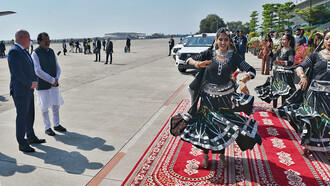In an ever-growing world of instability and despite efforts to increase its military extrovertedness, such as its Operation Aspides, the EU is still woefully underprepared to meet the demands of global security. While the EU might have been founded under peaceful purposes meant to bring European nations closer in the wake of WW2, the world's third power not having a formidable military force is unacceptable in the 21st century. Sure, there's the Common Security and Defence Policy (CSDP), European Defense Agency, and Interpol amongst other European enforcement agencies. Yet, they pale in comparison to the United States and NATO peacekeeping forces. These agencies simply do not have the same degree of funding and resources as their American counterparts.
This means that European security and defense have effectively been outsourced because of a false sense of security. As we have seen in the past decade or so, relying on foreign powers for critical resources (I am looking at you, Germany) and its addiction to Russian gas is foolish and irresponsible. Is outsourcing defense any less irresponsible? Maybe 20 or 30 years ago, Europe could afford to do that with the US’s nuclear umbrella, but nowadays it is simply an unrealistic feat.
The EU’s current military force, the CSDP, has had a mixed track record in foreign operations and is stifled by a bureaucracy that is unable to adequately respond to the changing nature of the environment on the battlefield. Comprehensive studies have highlighted these difficulties both on the field and in the office1, which can hamper Europe’s reputation in the developing world.
In its latest military undertaking, Operation Aspides off Yemen, the EU has yet to prove to the world that it can provide security in unstable regions of the world while enhancing its own strategic autonomy. Operation Aspides has only provided safe passage to several hundred ships out of the several thousand that pass through the strait. Its unwillingness to launch pre-emptive strikes, unlike its American counterparts' operation, compounds this. The CSDP cannot engage offensively; this is a mistake, and it must change. Critical to any major power in the world is a military force that is willing to engage with hostile threats in not only a reactionary posture but one that is offensive as well.
The United States is showing less and less willingness to involve itself in expensive conflicts around the world that have been proven to be politically unpopular at home. This is leaving a gap in international order and security that adversaries such as Russia and China should have no business filling. This leaves the EU the only other global power left that could play a role in global affairs via military means. Simply releasing statements of condemnation or deploying small armed contingents is not enough for the world's third-largest economic force. An EU-wide army would force the EU to invest hundreds of billions more in research, innovation, policy, and general defense spending. While Operation Aspides was a good first baby step for the EU in demonstrating autonomous military capabilities, a heap of work is necessary.
However, it is also in my opinion that the necessary work is not something that the EU is fully willing to do. After all, it took a full-scale invasion involving hundreds of thousands of soldiers on a sovereign nation for most of Europe to finally meet the 2% defense spending threshold required for being a NATO member. The EU still does not have a fully funded mechanism for interborder military mobility; in fact, it only amounted to 1.7 billion euros and is asinine slow according to a report from the European Court of Auditors. In addition, the EU’s painstaking slowness in passing directives requires agreement from all 27 member states on the framework of these directives. Unless, that is, the EU utilizes its undemocratic trilogue backchannels to pass legislation if it means anything will get done after all.
Lastly, the implementation of EU directives means that 27 different countries of varying institutional quality are all responsible for enforcing the same legislation. It’s no secret that billions have gone to waste because of this. In fact, over 196 billion Euros have been misused according to the European Court of Auditors. An EU army would require supranational implementation rather than intergovernmental implementation, something that many EU leaders are not in full support of at this point.
All in all, the European Union must respond to this changing new world with more proactive means and rather than sit idly by. The EU, while making baby steps in the right direction, needs agile supranational political leadership that can effectively respond to the changing world around them without getting stuck in legislative procedure or domestic squabbles amongst EU member states' politics. French President Emmanuel Macron’s proposition for an EU army, while retaining national armed forces, should be the solution to this, if only that idea were agreed upon by 26 other governments.
References
1 Implementing CSDP missions at Taylor & Francis.















